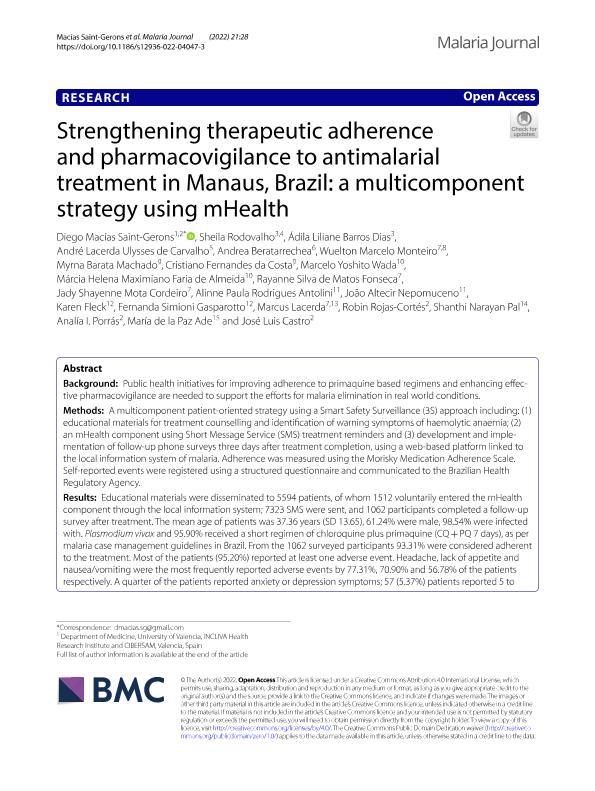Artículo
Strengthening therapeutic adherence and pharmacovigilance to antimalarial treatment in Manaus, Brazil: a multicomponent strategy using mHealth
Macías Saint Gerons, Diego; Rodovalho, Sheila; Barros Dias, Ádila Liliane; Lacerda Ulysses de Carvalho, André; Beratarrechea, Andrea Gabriela ; Monteiro, Wuelton Marcelo; Barata Machado, Myrna; Fernandes da Costa, Cristiano; Yoshito Wada, Marcelo; Maximiano Faria de Almeida, Márcia Helena; Silva de Matos Fonseca, Rayanne; Mota Cordeiro, Jady Shayenne; Rodrigues Antolini, Alinne Paula; Nepomuceno, João Altecir; Fleck, Karen; Simioni Gasparotto, Fernanda; Lacerda, Marcus; Rojas Cortés, Robin; Pal, Shanthi Narayan; Porrás, Analía I.; Ade, María de la Paz; Castro, José Luis
; Monteiro, Wuelton Marcelo; Barata Machado, Myrna; Fernandes da Costa, Cristiano; Yoshito Wada, Marcelo; Maximiano Faria de Almeida, Márcia Helena; Silva de Matos Fonseca, Rayanne; Mota Cordeiro, Jady Shayenne; Rodrigues Antolini, Alinne Paula; Nepomuceno, João Altecir; Fleck, Karen; Simioni Gasparotto, Fernanda; Lacerda, Marcus; Rojas Cortés, Robin; Pal, Shanthi Narayan; Porrás, Analía I.; Ade, María de la Paz; Castro, José Luis
 ; Monteiro, Wuelton Marcelo; Barata Machado, Myrna; Fernandes da Costa, Cristiano; Yoshito Wada, Marcelo; Maximiano Faria de Almeida, Márcia Helena; Silva de Matos Fonseca, Rayanne; Mota Cordeiro, Jady Shayenne; Rodrigues Antolini, Alinne Paula; Nepomuceno, João Altecir; Fleck, Karen; Simioni Gasparotto, Fernanda; Lacerda, Marcus; Rojas Cortés, Robin; Pal, Shanthi Narayan; Porrás, Analía I.; Ade, María de la Paz; Castro, José Luis
; Monteiro, Wuelton Marcelo; Barata Machado, Myrna; Fernandes da Costa, Cristiano; Yoshito Wada, Marcelo; Maximiano Faria de Almeida, Márcia Helena; Silva de Matos Fonseca, Rayanne; Mota Cordeiro, Jady Shayenne; Rodrigues Antolini, Alinne Paula; Nepomuceno, João Altecir; Fleck, Karen; Simioni Gasparotto, Fernanda; Lacerda, Marcus; Rojas Cortés, Robin; Pal, Shanthi Narayan; Porrás, Analía I.; Ade, María de la Paz; Castro, José Luis
Fecha de publicación:
12/2022
Editorial:
BioMed Central
Revista:
Malaria Journal
ISSN:
1475-2875
Idioma:
Inglés
Tipo de recurso:
Artículo publicado
Clasificación temática:
Resumen
Background: Public health initiatives for improving adherence to primaquine based regimens and enhancing effective pharmacovigilance are needed to support the efforts for malaria elimination in real world conditions. Methods: A multicomponent patient-oriented strategy using a Smart Safety Surveillance (3S) approach including: (1) educational materials for treatment counselling and identification of warning symptoms of haemolytic anaemia; (2) an mHealth component using Short Message Service (SMS) treatment reminders and (3) development and implementation of follow-up phone surveys three days after treatment completion, using a web-based platform linked to the local information system of malaria. Adherence was measured using the Morisky Medication Adherence Scale. Self-reported events were registered using a structured questionnaire and communicated to the Brazilian Health Regulatory Agency. Results: Educational materials were disseminated to 5594 patients, of whom 1512 voluntarily entered the mHealth component through the local information system; 7323 SMS were sent, and 1062 participants completed a follow-up survey after treatment. The mean age of patients was 37.36 years (SD 13.65), 61.24% were male, 98.54% were infected with. Plasmodium vivax and 95.90% received a short regimen of chloroquine plus primaquine (CQ + PQ 7 days), as per malaria case management guidelines in Brazil. From the 1062 surveyed participants 93.31% were considered adherent to the treatment. Most of the patients (95.20%) reported at least one adverse event. Headache, lack of appetite and nausea/vomiting were the most frequently reported adverse events by 77.31%, 70.90% and 56.78% of the patients respectively. A quarter of the patients reported anxiety or depression symptoms; 57 (5.37%) patients reported 5 to 6 warning symptoms of haemolytic anaemia including jaundice and dark urine in 44 (4.14%). Overall, three patients presenting symptoms of haemolytic anaemia attended a hospital and were diagnosed with G6PD deficiency, and one had haemolysis. All of them recovered. Conclusions: Under real world conditions, a multicomponent patient-oriented strategy using information and communication technologies allowed health care providers to reinforce treatment adherence and enhance safety surveillance of adverse events associated with regimens using primaquine. Active monitoring through phone surveys also reduced under-reporting of ADRs. This approach is low-cost, scalable and able to support prioritized activities of the national malaria programme.
Palabras clave:
ADHERENCE
,
MHEALTH
,
PHARMACOVIGILANCE
,
PRIMAQUINE
,
SMS
Archivos asociados
Licencia
Identificadores
Colecciones
Articulos(SEDE CENTRAL)
Articulos de SEDE CENTRAL
Articulos de SEDE CENTRAL
Citación
Macías Saint Gerons, Diego; Rodovalho, Sheila; Barros Dias, Ádila Liliane; Lacerda Ulysses de Carvalho, André; Beratarrechea, Andrea Gabriela; et al.; Strengthening therapeutic adherence and pharmacovigilance to antimalarial treatment in Manaus, Brazil: a multicomponent strategy using mHealth; BioMed Central; Malaria Journal; 21; 1; 12-2022; 1-11
Compartir
Altmétricas



